Generality
Hypothyroidism is the morbid state that reflects the inability of the thyroid to synthesize a quantity of hormones adapted to the needs of the entire organism.
The causes of hypothyroidism are numerous and very varied in nature. Consequently, doctors have thought of subdividing them into 4 major categories, from which as many forms of hypothyroidism derive: primitive hypothyroidism, secondary hypothyroidism, tertiary hypothyroidism and iatrogenic hypothyroidism.

Hypothyroidism produces different symptoms and signs, depending on the severity and age at which it appears: in the fetus and in young individuals, it mainly affects the intellectual and somatic development; in adults, on the other hand, it is the cause of a less profound but still important symptomatology, which generally consists of: dry skin, thinning hair, mixed-facial facies, fatigue, cold skin, bradycardia, drowsiness, constipation, asthenia, low temperature intolerance, etc.
For a correct diagnosis, physical examination and blood quantification of TSH (pituitary hormone) and sometimes also of T3 and T4 (thyroid hormones) are essential.
The treatment of hypothyroidism is based on the recovery of functional thyroid activity, through the daily intake of synthetic thyroxine (or synthetic T4).
Failure to treat hypothyroidism can have serious repercussions on the health status of patients.
Brief review of the anatomy and functions of the thyroid
The thyroid is an unequal organ, located in the anterior region of the neck, at the base of the throat.
Similar in shape to a butterfly, this gland plays a very important physiological role, as it deals with regulating:
- Body metabolism (for example, affects oxygen consumption; controls the synthesis and degradation of cholesterol; stimulates lipolysis and lipogenesis; increases glycogenolysis and gluconeogenesis, etc.);
- Skeletal and cerebral development, starting from fetal life;
- Protein synthesis;
- The development of the skin, the hair apparatus and the genital organs;
- The heartbeat;
- Body temperature;
- The hematopoiesis.
To carry out all these regulatory activities, the thyroid uses three hormones that it produces by itself and feeds into the blood; The hormones in question are: triiodothyronine (also called T3 ), thyroxine (also called T4 ) and calcitonin .
The own production of hormones and their introduction into the blood circulatory stream cause the thyroid to re-enter the list of human endocrine glands.

What is hypothyroidism?
Hypothyroidism is a morbid condition, caused by the inability of the thyroid to synthesize a quantity of hormones (T3 and T4 in particular) adequate to the needs of the human organism; more rarely, it may depend on the resistance of the various tissues of the body to the action of the aforementioned hormones.
In other words, those suffering from thyroidism possess a poorly productive thyroid or tissues which, for some reason, are resistant to the action of thyroid hormones.
Hypothyroidism: what kind of disease is it?
Hypothyroidism is included in the list of so-called thyroid diseases, along with hyperthyroidism, goiter, thyroid nodules, thyroid cancer and thyroiditis .
Thyroid diseases are widespread in the general population. In fact, according to a survey of the World Health Organization, around the world, people with a pathology or dysfunction of the thyroid would be about one billion. As for Italy, people with a thyroid disease represent 20% of the entire population.
Based on reliable statistical surveys, thyroid diseases mainly affect women (they have 20% more chance of getting sick than men) and older people.
Moreover, from other research, a particular association has emerged with type 1 diabetes mellitus, pernicious anemia, rheumatoid arthritis, autoimmune diseases, iodine deficiency in the diet and massive exposure to ionizing radiation.
| Hyperthyroidism | It is the direct consequence of an overactive thyroid that produces thyroid hormones even when there is really no need for it. In other words, it occurs when the thyroid gland produces a quantity of thyroid hormones higher than the body's needs. It is the opposite condition to hypothyroidism. |
Goiter | It is the generalized enlargement of the thyroid. Its onset can be associated with various problems, including hyperthyroidism and hypothyroidism. |
Thyroid nodules | They are benign, slow-growing tumors that, in some circumstances, can lead to different health problems. |
Thyroid cancer | It is the malignant thyroid tumor and represents a major cause of thyroidectomy, which is the thyroid removal surgery. |
thyroiditis | It is inflammation of the thyroid. It often has an autoimmune origin. |
Causes
The possible causes of hypothyroidism are numerous and varied among them; to simplify the treatment, doctors and experts in thyroid diseases have decided to classify them into 4 categories:
- Primitive causes, which are at the head of the so-called primitive hypothyroidism ;
- Secondary causes, which are at the origin of the so-called secondary hypothyroidism ;
- Tertiary causes, which are responsible for the so-called tertiary hypothyroidism ;
- Iatrogenic causes, which are at the head of the so-called iatrogenic hypothyroidism .
Primitive hypothyroidism
The hypothyroidism that derives from a specific dysfunction of the thyroid gland takes the name of primitive.
The main causes of primitive hypothyroidism are: autoimmune thyroid diseases (eg Hashimoto's thyroiditis ), iodine deficiency following a diet poor in this mineral and partial or total removal of the thyroid gland (thyroidectomy is practiced, for example, for the treatment of a thyroid tumor).
Iodine deficiency: deepening
Iodine is an essential mineral for normal thyroid function; if iodine is missing, the thyroid gland cannot synthesize its hormones and hypothyroidism occurs. Fortunately, the body has good reserves of both iodine and thyroid hormones, enough for about 60-90 days, and the simple consumption of iodized salt is enough to prevent the risk of specific deficiencies.
However, there are some areas of the planet, where chronic iodine deficiency in nutrition is still one of the main causes of hypothyroidism.
Secondary hypothyroidism
The hypothyroidism following a malfunctioning of the pituitary gland - gland regulating the activity of the thyroid - or of the adjoining pituitary hormone system (or TSH) is secondary.
The aforementioned malfunction can be caused by pituitary neoplasms (eg: pituitary adenomas) or lesions affecting the pituitary structure (eg, post-traumatic lesions, post-aneurysm, post-radiotherapy, etc.).
Tertiary hypothyroidism
All hyperthyroidisms following a malfunction of the hypothalamus - another regulating gland of the thyroid activity - and of the adjoining hypothalamic hormone system (or TRH) are tertiary.
Hypothalamus malfunction can be caused by hypothalamus or lesions affecting the hypothalamic structure.
Iatrogenic hypothyroidism
Hypothyroidism is called iatrogenic due to incorrect medical treatment .
In general, iatrogenic hypothyroidism arises due to excessive doses of antithyroid drugs, administered with the intent to cure a form of hyperthyroidism.
Epidemiology
It is estimated that hypothyroidism affects an average of 0.5-1% of the population, with a clear prevalence in women and people of advanced age (exactly as one would expect from a thyroid disease).
The most common form of hypothyroidism is primitive hypothyroidism.
Hypothyroidism has a strong association with two fairly well known genetic diseases: Down syndrome and Turner syndrome (an exclusive disease of the female sex).
Symptoms
To learn more: Hypothyroidism symptoms
The symptoms and signs of hypothyroidism vary depending on the stage of development during which they arise.
During fetal life and in the years of early youth, the presence of hypothyroidism is responsible for serious and irreversible alterations in body development ( slow growth rate or pituitary dwarfism ) and brain development (the so-called cretinism ); in the child and in the almost adolescent child, moreover, hypothyroidism also involves a delay in sexual development .
In adult subjects, the consequences of the disease are decidedly less profound, compared to the two previous circumstances, but still important and obvious; normally, they consist of:
- Dry skin and thin and thin hair;
- Physical fatigue and chronic muscle weakness (asthenia). They are a consequence of the negative effect that hypothyroidism has on protein synthesis;
- Narrow eyelids and rhymes, scarce eyebrows, half-open mouth and swollen tongue. These signs give the face of the patient with hypothyroidism the unmistakable and unintelligent aspect of the " mixed- facial facies ";
- Cold skin and intolerance at low temperatures. A reduction in thyroid hormones slows metabolism and oxygen consumption, and affects thermogenic activity;
- Drowsiness, lethargy, depression and slowing of ideational processes. These symptoms arise due to nerve alterations induced by hypothyroidism;
- Constipation, increased body weight, pallor, anemia, hoarseness and lowering of the tone of the voice;
- Memory deficit;
- Hearing loss;
- Abundant menstrual flows (menorrhagia);
- Cramps, joint stiffness and joint swelling;
- Bradycardia, reduction of the contractile force of the heart and vasoconstriction;
- Increased levels of low-density lipoprotein (LDL) and serum triglycerides, resulting in a significant increase in the risk of coronary heart disease.

Special features of primitive hypothyroidism in adults
When it is primitive, hypothyroidism in adults is characterized by a slow and very gradual onset, which can therefore escape the eyes of the doctor and the patient for a long time.
Complications
In the absence of adequate treatment, hypothyroidism can degenerate and give rise to various complications, including:
- Goiter;
- Aggravation of heart problems, the consequences of which can be enlarged heart, myocardial infarction, heart failure, etc. This aggravation is the result of the consolidated and marked increase in the levels of low-density lipoprotein (LDL) and triglycerides in serum;
- Peripheral neuropathy . It is the morbid condition resulting from damage and malfunction of the nerves of the peripheral nervous system (PNS);
- Mixedema . It is a particular form of subcutaneous edema, which occurs following the accumulation of mucopolysaccharides in the dermis. The presence of low body temperature, chest pain, hypoglycemia, lack of response and slowed breathing may depend on myxedema.
In extreme cases, myxedema leads to coma ; the coma due to myxedema takes the name of mixedematous coma ;
- Decreased fertility or actual infertility . It is typical of women. In fact, low levels of thyroid hormones affect ovulation.
- Congenital defects in children born of sick women . Congenital defects generally consist of intellectual problems and somatic developmental deficits.
When should I go to the doctor?
It is good for an adult individual to consult his treating physician in the presence of fatigue without a reason, associated with the most typical symptoms of hypothyroidism, such as dry skin, pallor, swollen face ( mixed- facialized facies ), constipation or sparse and thin hair.
In addition, all those who, in the more or less recent past, have had to undergo thyroidectomy, antithyroid- based pharmacological treatments, or head-neck or part-radiotherapy sessions should periodically contact a doctor who is an expert in thyroid disease. upper chest.
Since hypothyroidism is widespread in the female population of advanced age, doctors advise those falling into this category to undergo an annual blood test of thyroid hormones, in order to detect any anomalies in time.
Diagnosis
The diagnosis of hypothyroidism is based on an accurate physical examination (evaluation of symptoms) and on a simple blood test that quantifies the levels of pituitary hormone TSH and, sometimes, thyroid hormones.
High levels of TSH and, in the case of their quantification, low levels of thyroid hormones T3 and T4, are indicative of the presence of hypothyroidism.
Why measure TSH, a pituitary hormone, to understand if hypothyroidism is present?
The production of T3 and T4, by the thyroid, depends on the activity of the pituitary gland and in particular on the presence of the pituitary hormone TSH.
In people with hypothyroidism, TSH levels are peculiarly high, because the pituitary tries in every way to stimulate the production of T3 and T4, by the thyroid, without any success.
Physicians use TSH instead of thyroid hormones, as it is a more sensitive test, it allows the early identification of a functional thyroid deficiency and guarantees the planning of the most appropriate drug therapy.
Therapy
To learn more: Drugs for the treatment of hypothyroidism
The therapy of hypothyroidism is based on the recovery and maintenance of the functionality of the thyroid gland, through the daily administration of synthetic thyroxine (eg: levothyroxine ), orally.
The administration of synthetic thyroxine is an example of hormone replacement therapy .
Hormone replacement therapies must be appropriate to the patient's needs, as, in the specific case of hypothyroidism:
- Excessive intake of synthetic thyroxine can lead to hyperthyroidism
while
- An insufficient dose of synthetic thyroxine can be completely ineffective.
When you are undergoing hormone replacement therapy - and in this sense, synthetic thyroxine therapy is no exception - it is very important never to skip a dose and never vary the amounts prescribed by your doctor.
How is the correct dosage of synthetic thyroxine determined?
To determine the right dosage of synthetic thyroxine, doctors rely on TSH levels, which they periodically measure every 2 or 3 months .
Excessive doses of synthetic thyroxine are responsible for characteristic symptoms such as: increased appetite, insomnia and palpitations.
Insufficient doses of synthetic thyroxine, on the other hand, are the cause of a persistence of the typical symptomatology of hypothyroidism.
If the intake of synthetic thyroxine is adequate, this drug is generally completely free of side effects.
Importance of the diet
A very important aspect in the treatment of hypothyroidism has as its object the diet, which must be tailored to the patient.
All the information related to the ideal diet for hypothyroidism is present in this article.
Prognosis
If the diagnosis is early and the treatment is adequate, there is a good chance of controlling hypothyroidism and ensuring a favorable prognosis.
Hypothyroidism - Video: Causes, Symptoms, Cures
X Problems with video playback? Reload from YouTube Go to Video Page Go to Wellness Destination Watch the video on youtube



